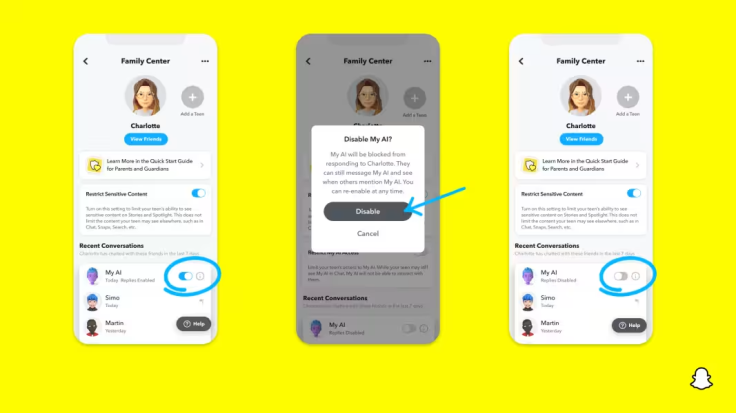Snapchat will soon be letting parents decide if their teenage children can use the social media's "My AI" chatbot, the latest turn of events with new child safety measures in social platforms.

The feature will let parents disable the chatbot as part of the options in the teen's safety and privacy settings in the Family Center feature, according to its blog post on Thursday.
Once turned off, teen users will only be notified by the chatbot that it has been disabled when messaged.
Accessing the Family Center will also be easier by searching the settings from their profile or by clicking the parent's profile menu.

Concerns for Snapchat's 'My AI' Chatbot
Snapchat's "My AI" chatbot was first released in April last year. The feature was initially met with concerns from parents and other users for "terrifying" and "creepy" interactions with the AI.
Some users reported the chatbot revealing their exact location even without providing any personal information.
"My AI" is part of Snapchat's partnership with OpenAI to integrate its chatbot software, ChatGPT, into the mobile and web platforms.
ChatGPT has been repeatedly criticized over the past year, amid its user growth, for spreading misinformation, providing inappropriate responses, and being vulnerable to sharing other user data.
Snapchat has earlier said that it is committed to improving its chatbot feature.
The chatbot was part of Snapchat's decision to integrate AI-powered extend tools into the platform after the hype on generative AI made its way into many social media discussions.
More Parental Controls on Social Media
The new safety features, particularly parental controls, on social media follow after a Federal judge ruled that Snapchat is accountable for harming underage users' mental health for its addictive features.
The ruling also included Meta, TikTok, and Google. The companies quickly moved to dismiss the notion on the grounds of violating the First Amendment.
Since then, Meta has bolstered its child safety features by placing all accounts owned by teenagers to the most restrictive content control available.
The restrictions now both apply to new and existing accounts on Facebook and Instagram.
In turn, Snapchat has been adding parental controls for its Family Center regularly since it launched in 2022.
Related Article : Snapchat Adds Generative AI Feature 'Dreams'









